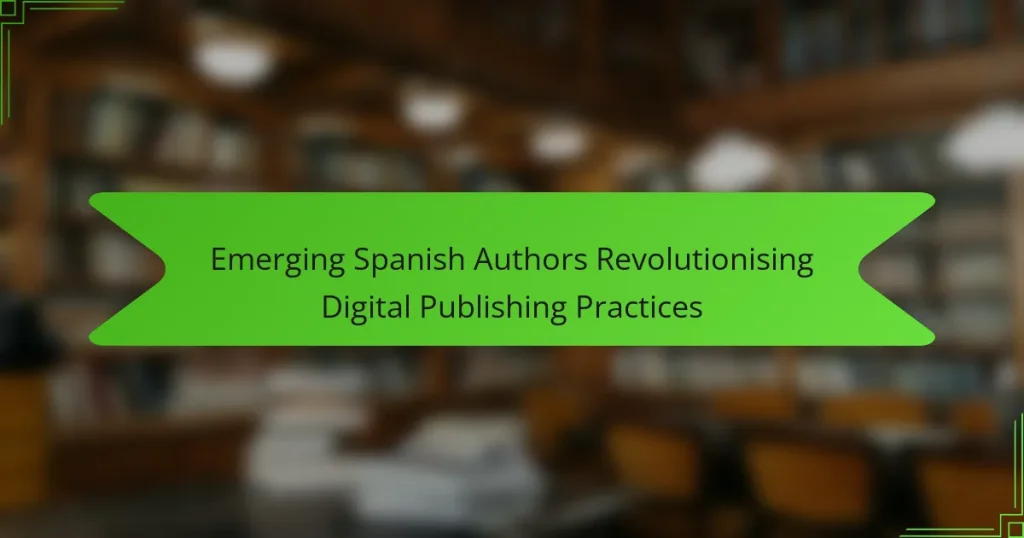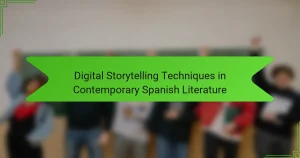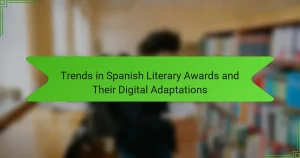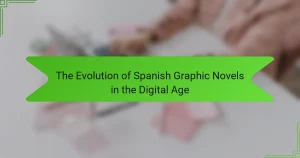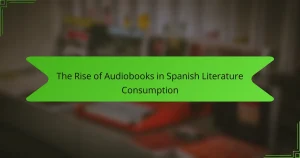Emerging Spanish authors are transforming digital publishing through innovative storytelling and diverse narratives. They utilize social media for direct reader engagement, bypass traditional publishing barriers, and embrace self-publishing for creative freedom. Collaborative projects and multimedia formats enhance visibility and foster community, reshaping the literary landscape in Spain. These authors face challenges such as limited distribution and the need for digital marketing skills.
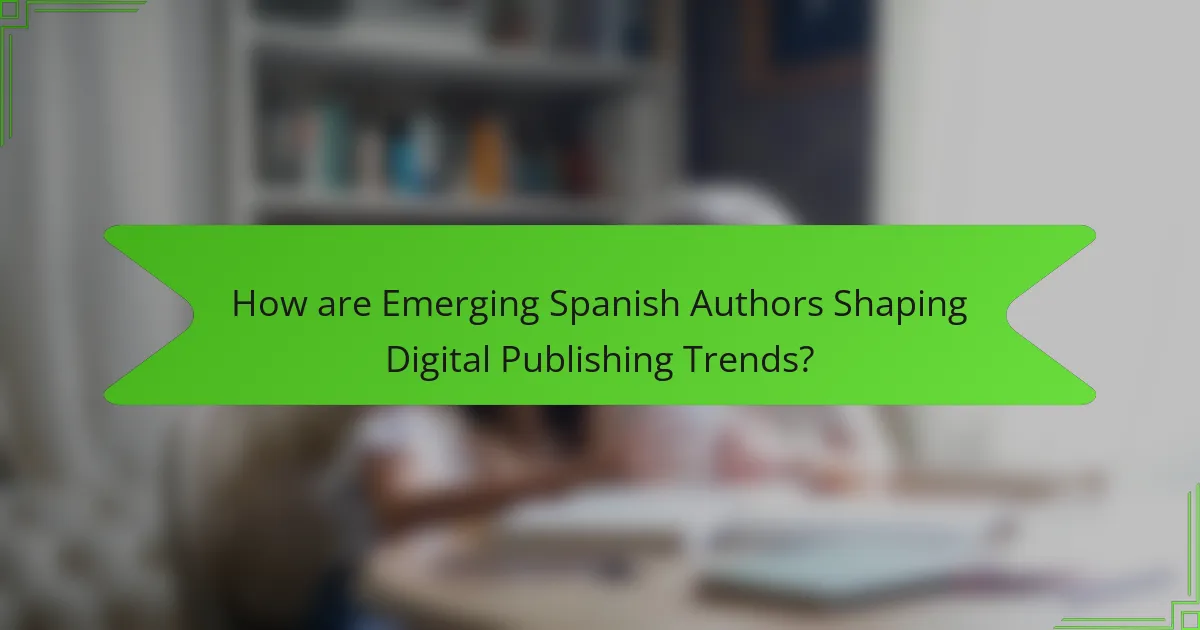
How are Emerging Spanish Authors Shaping Digital Publishing Trends?
Emerging Spanish authors are significantly influencing digital publishing trends through innovative storytelling and diverse narratives. Their unique perspectives engage global audiences and challenge traditional publishing norms.
These authors often utilize social media platforms to promote their work, creating direct connections with readers. For instance, many leverage Instagram and Twitter to share snippets of their writing, garnering immediate feedback and building a loyal following.
Additionally, the rise of self-publishing among these authors is reshaping market dynamics. They often bypass conventional publishing routes, allowing for greater creative freedom and faster release schedules. This shift not only democratizes the publishing landscape but also fosters a rich variety of voices.
Moreover, collaborations between emerging authors and tech companies are driving new formats and interactive content. This trend enhances reader engagement through multimedia experiences, such as audiobooks and interactive e-books, reflecting the evolving preferences of modern readers.
What Innovative Techniques are They Using?
Emerging Spanish authors are utilizing innovative techniques like interactive storytelling and multimedia integration. These approaches enhance reader engagement and redefine narrative structures. For instance, authors are incorporating video and audio elements to complement text, creating immersive experiences. Additionally, the use of social media platforms for serialized storytelling allows for real-time audience feedback, fostering community interaction. This shift towards digital-first strategies is revolutionizing traditional publishing practices in the Spanish literary landscape.
Which Platforms are Most Popular Among These Authors?
The most popular platforms among emerging Spanish authors are social media, blogs, and self-publishing websites. These authors leverage platforms like Instagram and Twitter for engagement, while blogs serve as personal spaces for storytelling. Self-publishing platforms like Amazon Kindle Direct Publishing enable them to reach wider audiences.
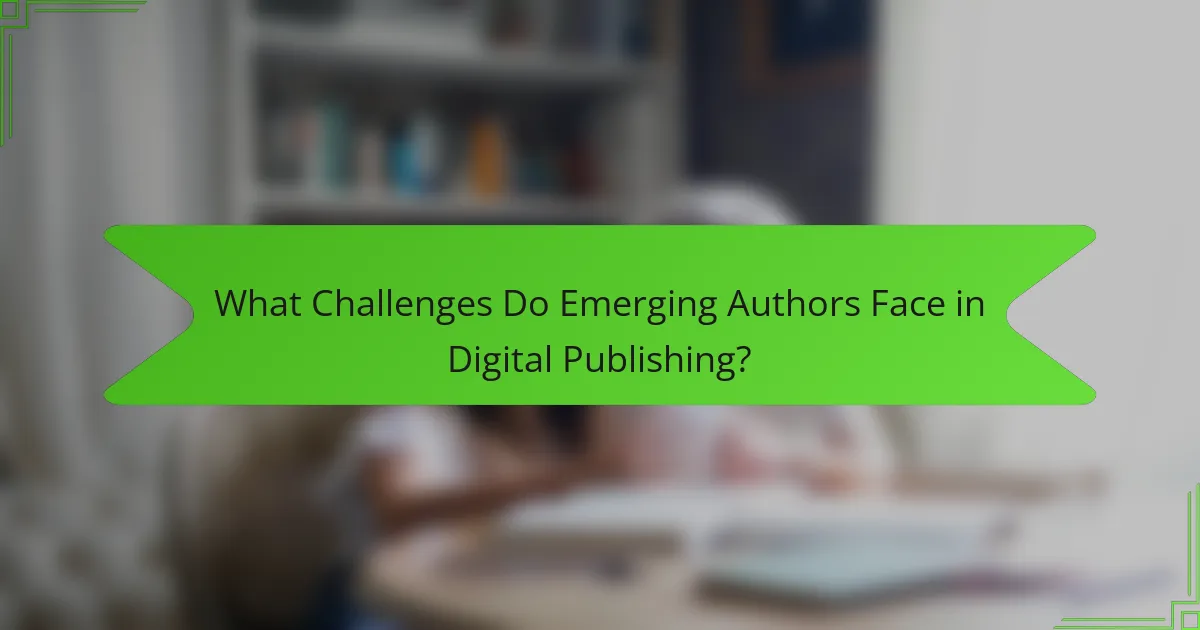
What Challenges Do Emerging Authors Face in Digital Publishing?
Emerging Spanish authors face numerous challenges in digital publishing. These include limited access to distribution channels, competition with established authors, and the need for digital marketing skills. Many lack the resources to effectively promote their work online, which can hinder visibility. Additionally, navigating copyright issues in a digital landscape poses a significant barrier. The evolving nature of digital platforms requires authors to continuously adapt their strategies to reach their audience effectively.
How Do Traditional Publishing Norms Impact Their Success?
Traditional publishing norms often hinder the success of emerging Spanish authors in digital spaces. These authors challenge established practices by embracing innovative platforms and diverse storytelling methods. Traditional norms prioritize print formats and gatekeeping, limiting accessibility for new voices. In contrast, digital publishing allows for broader reach and engagement, enabling authors to connect directly with audiences. As a result, these authors are redefining success metrics, focusing on audience interaction and digital presence rather than traditional sales figures. This shift highlights the unique attributes of digital platforms in fostering creativity and inclusivity in the literary landscape.
What Role Does Audience Engagement Play?
Audience engagement is crucial for emerging Spanish authors as it drives visibility and fosters community. Active interaction with readers enhances loyalty and encourages feedback, shaping content direction. Digital platforms enable real-time communication, allowing authors to adapt their strategies effectively. Engaged audiences often share content, amplifying reach and creating new opportunities for collaboration and growth.
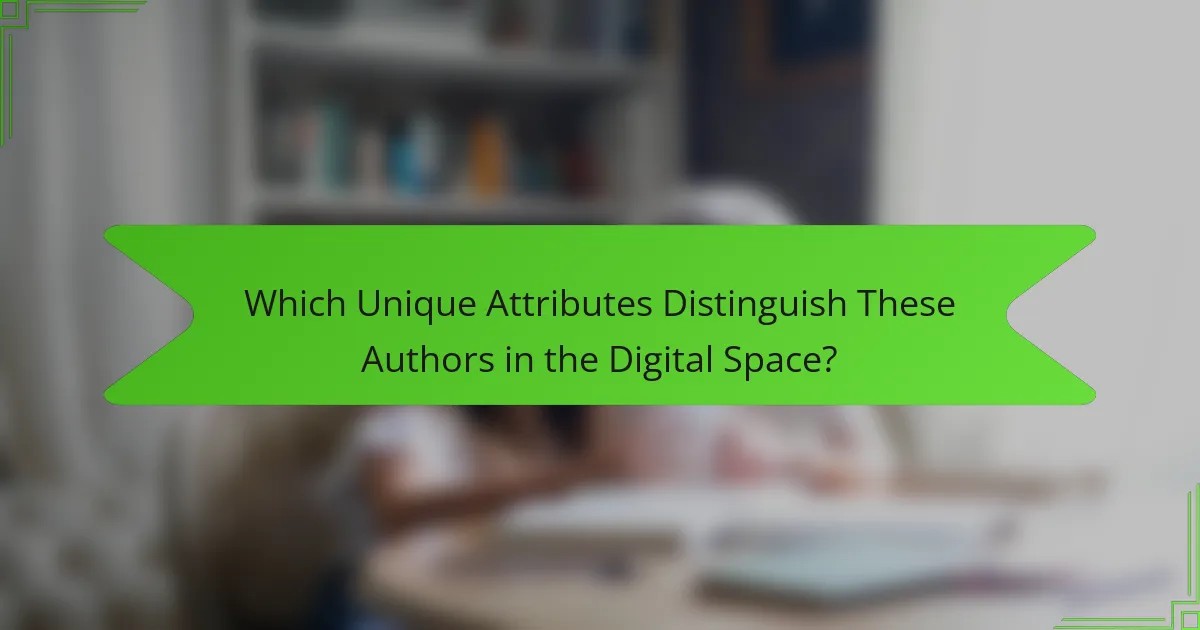
Which Unique Attributes Distinguish These Authors in the Digital Space?
Emerging Spanish authors in the digital space are distinguished by their innovative storytelling techniques and use of multimedia. They leverage interactive formats, such as augmented reality and digital narratives, to enhance reader engagement. Unique attributes include their focus on cultural identity and social issues, which resonate with diverse audiences. Additionally, many utilize social media platforms for direct interaction with readers, fostering a community around their work. This approach not only democratizes publishing but also allows for real-time feedback and collaboration.
How Do Their Cultural Backgrounds Influence Their Work?
Cultural backgrounds significantly influence the work of emerging Spanish authors in digital publishing. Their diverse experiences shape storytelling, themes, and stylistic choices. For instance, authors from regional backgrounds often incorporate local dialects and traditions, enriching narratives with authenticity. This unique attribute enhances reader engagement and fosters cultural appreciation. Additionally, the interplay of history and contemporary issues in their works reflects Spain’s multifaceted identity, allowing authors to address societal challenges through innovative formats. As a result, these authors are revolutionizing digital publishing practices by blending tradition with modern technology, creating a distinctive literary voice that resonates globally.
What Genres Are They Most Known For?
Emerging Spanish authors are most known for genres such as contemporary fiction, speculative fiction, and digital poetry. These genres reflect innovative storytelling and experimental formats in the digital publishing landscape. Notable authors like Javier Cercas and Elvira Lindo showcase unique narrative styles that challenge traditional conventions. Additionally, many authors explore themes of identity and social issues, resonating with a global audience.

What Are the Key Benefits of Digital Publishing for Emerging Authors?
Digital publishing offers emerging Spanish authors greater visibility, creative control, and access to global audiences. These authors can reach readers directly, bypassing traditional gatekeepers.
1. Increased Accessibility: Digital platforms allow authors to publish without significant upfront costs.
2. Global Reach: Authors can connect with international readers, expanding their market.
3. Creative Freedom: Digital publishing enables innovative formats and multimedia integration.
4. Real-Time Feedback: Authors can quickly gauge reader reactions and adjust their work accordingly.
5. Data Insights: Analytics tools help authors understand audience preferences and improve future works.
How Does Accessibility Affect Their Reach?
Accessibility significantly enhances the reach of emerging Spanish authors in digital publishing. By implementing inclusive practices, these authors can connect with diverse audiences, including those with disabilities. Accessible formats, such as audiobooks and e-readers with adjustable settings, cater to various reader preferences and needs. This approach not only broadens their market but also fosters a more inclusive literary community, ultimately driving engagement and sales.
What Are the Financial Implications of Digital Versus Traditional Publishing?
Digital publishing offers lower costs and broader reach compared to traditional publishing. Emerging Spanish authors are leveraging digital platforms to maximize their visibility and financial returns.
Digital publishing eliminates printing costs, allowing authors to retain a larger portion of their earnings. For instance, self-publishing can yield up to 70% royalties, while traditional routes often offer 10-15%.
Additionally, digital platforms enable authors to connect directly with readers, fostering community engagement and enhancing marketing efforts. This direct interaction can lead to increased sales and brand loyalty.
Emerging Spanish authors are also exploring innovative formats, such as audiobooks and interactive e-books, which can attract diverse audiences and create new revenue streams.
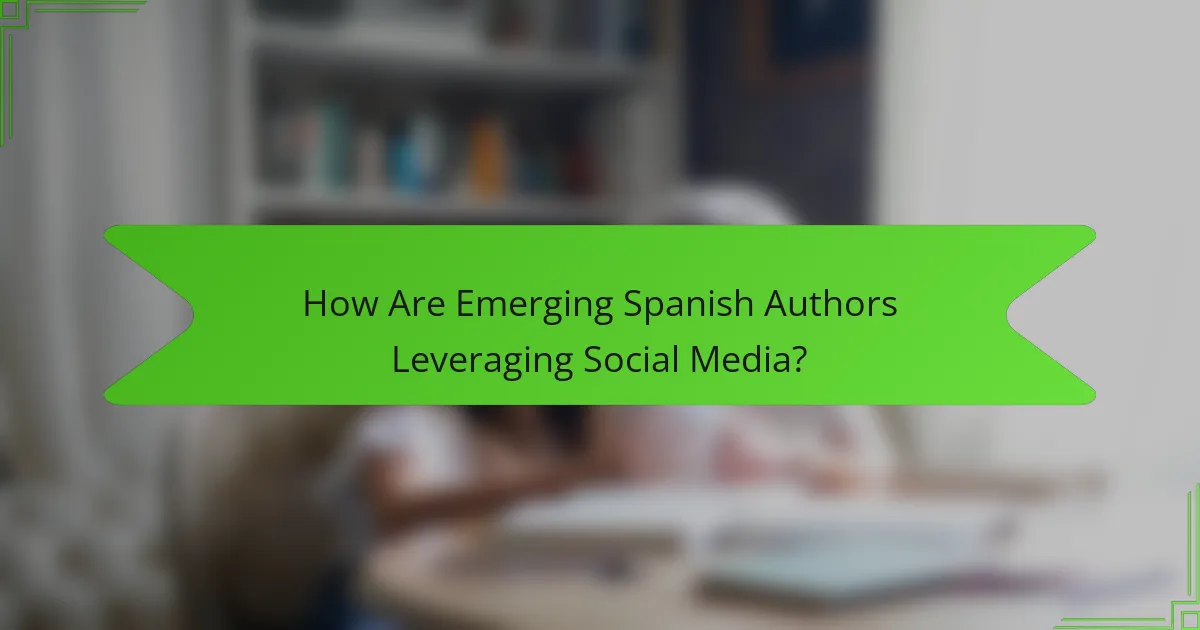
How Are Emerging Spanish Authors Leveraging Social Media?
Emerging Spanish authors are leveraging social media to enhance visibility and connect with readers. These authors utilize platforms like Instagram and Twitter to share their work, engage with audiences, and build personal brands. As a result, they can bypass traditional publishing barriers and reach wider audiences directly.
Social media allows for real-time feedback and interaction, fostering a community around their writing. For example, authors can host live readings or Q&A sessions, creating a personal touch that resonates with fans. This approach not only promotes their books but also cultivates loyalty among readers.
Additionally, many emerging authors collaborate with influencers to amplify their reach. These partnerships can result in increased exposure and sales, showcasing the effectiveness of social media strategies in modern publishing.
In summary, emerging Spanish authors are transforming digital publishing by utilizing social media as a powerful tool for engagement, promotion, and community building.
Which Platforms Yield the Best Results for Promotion?
Social media platforms and online literary communities yield the best results for promoting emerging Spanish authors. These platforms facilitate direct engagement with readers and allow authors to showcase their work effectively.
Platforms like Instagram and Twitter enable authors to share snippets of their writing and connect with literary influencers. Additionally, websites like Wattpad and Goodreads provide spaces for authors to publish their work and receive feedback, enhancing visibility.
Email newsletters also serve as a powerful tool for promotion, allowing authors to reach dedicated readers with updates and new releases. As a result, leveraging these platforms can significantly amplify an author’s reach and impact in the digital publishing landscape.
What Strategies Enhance Their Online Presence?
Emerging Spanish authors enhance their online presence through strategic use of social media, engaging storytelling, and innovative digital marketing. They leverage platforms like Instagram and Twitter to build personal brands and connect with readers. Collaborations with influencers and participation in online literary events further amplify their visibility. Additionally, utilizing SEO techniques helps their works reach wider audiences, while interactive content creates a dynamic reader experience.
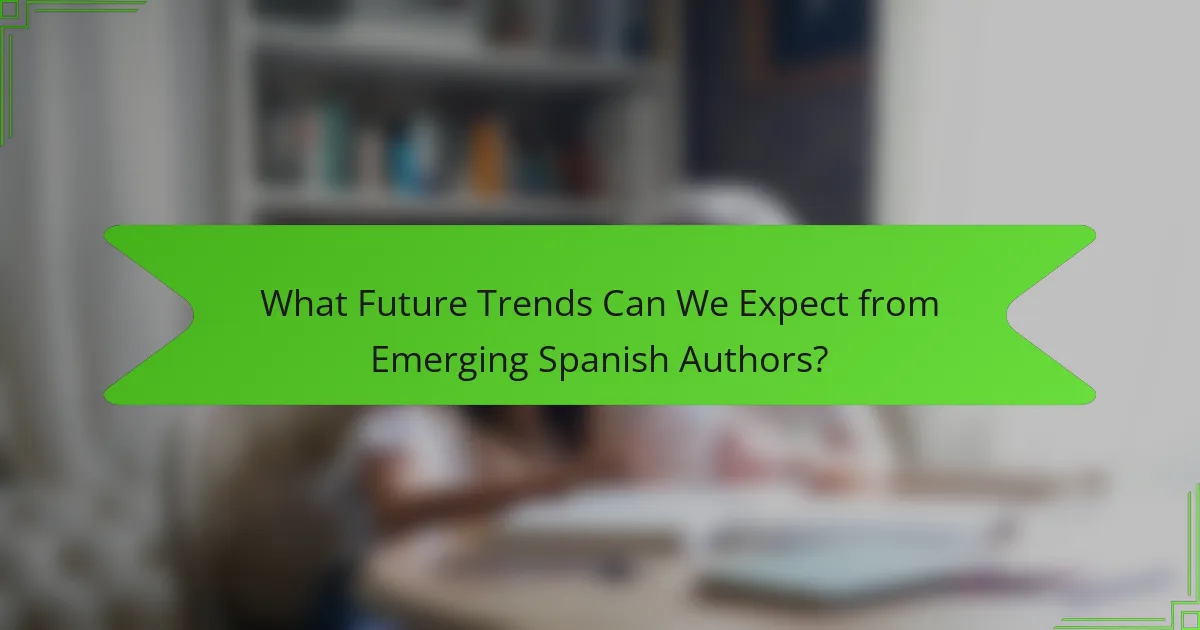
What Future Trends Can We Expect from Emerging Spanish Authors?
Emerging Spanish authors are reshaping digital publishing by embracing innovative platforms and interactive storytelling. They leverage social media for audience engagement and utilize self-publishing tools to maintain creative control. The rise of e-books and audiobooks allows for diverse formats, catering to various reader preferences. Collaborative projects among authors enhance visibility and foster community, driving a shift towards more inclusive narratives. As a result, these authors are not only expanding their reach but also redefining the literary landscape in Spain.
How Will Technology Continue to Influence Their Practices?
Technology will significantly shape the practices of emerging Spanish authors in digital publishing. Innovations like artificial intelligence and blockchain are transforming content creation and distribution. AI tools enhance writing efficiency and personalization, while blockchain ensures transparency and fair compensation. These advancements empower authors to reach wider audiences and maintain creative control. Additionally, social media platforms facilitate direct engagement with readers, fostering community and feedback. As a result, the landscape of digital publishing continues to evolve, allowing authors to innovate and adapt their practices effectively.
What Innovations Are on the Horizon for Digital Publishing?
Emerging Spanish authors are significantly transforming digital publishing through innovative storytelling techniques and unique content delivery. They leverage digital platforms to reach wider audiences and experiment with interactive narratives. For instance, authors like Javier Cercas and Rosa Montero utilize multimedia elements to enhance reader engagement. This approach not only revitalizes traditional storytelling but also introduces new formats, such as serialized fiction and immersive experiences, reflecting changing reader preferences. As a result, Spanish authors are at the forefront of a digital publishing revolution, pushing the boundaries of creativity and accessibility in literature.
What Best Practices Should Emerging Authors Follow for Success?
Emerging Spanish authors should focus on building a strong online presence, engaging with their audience, and leveraging digital platforms. They can enhance their visibility through social media, blogs, and author websites. Collaborations with established authors and participation in online literary communities can also boost their credibility. Additionally, understanding digital marketing strategies, such as SEO and content promotion, is crucial for reaching wider audiences. Emphasizing unique storytelling and cultural perspectives can differentiate their work in a competitive market.
